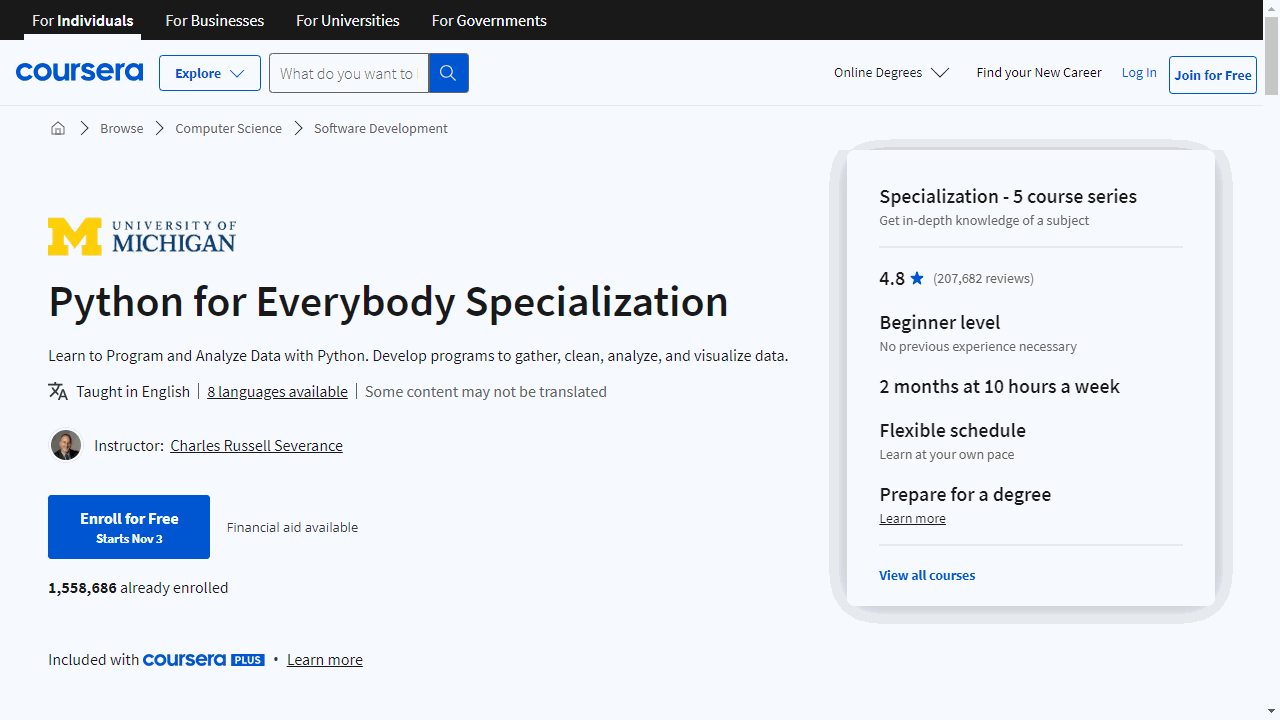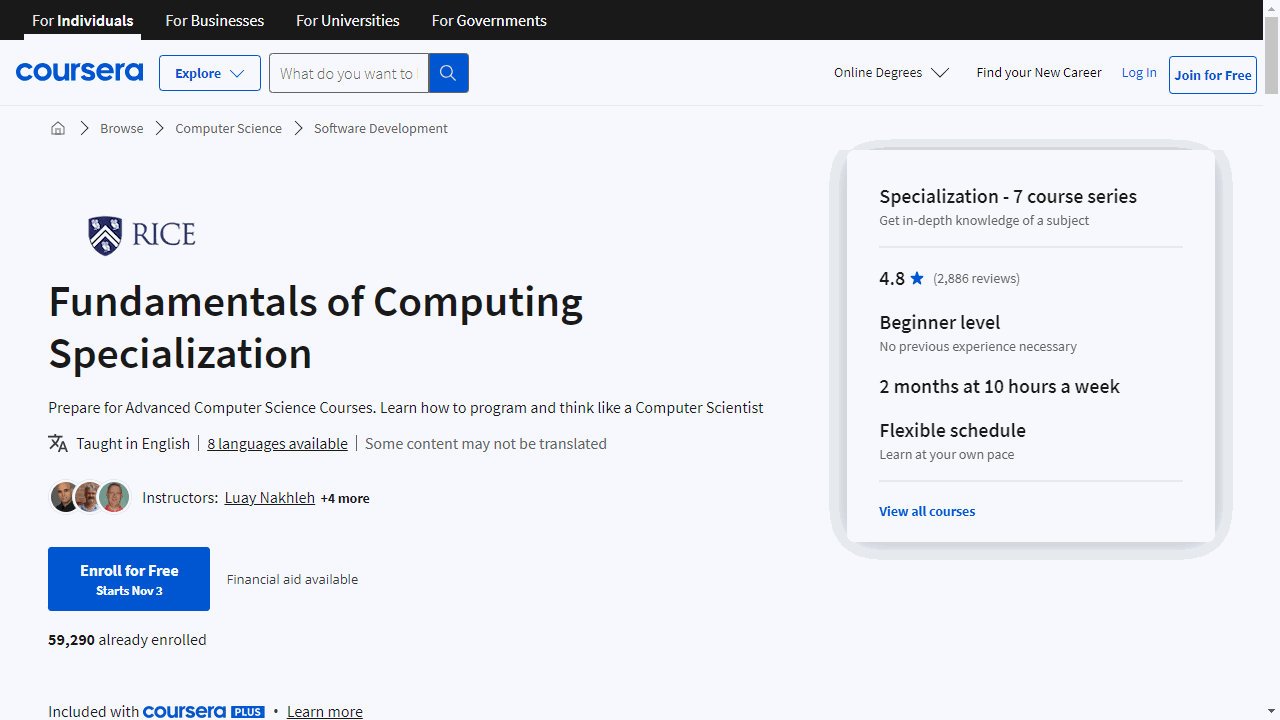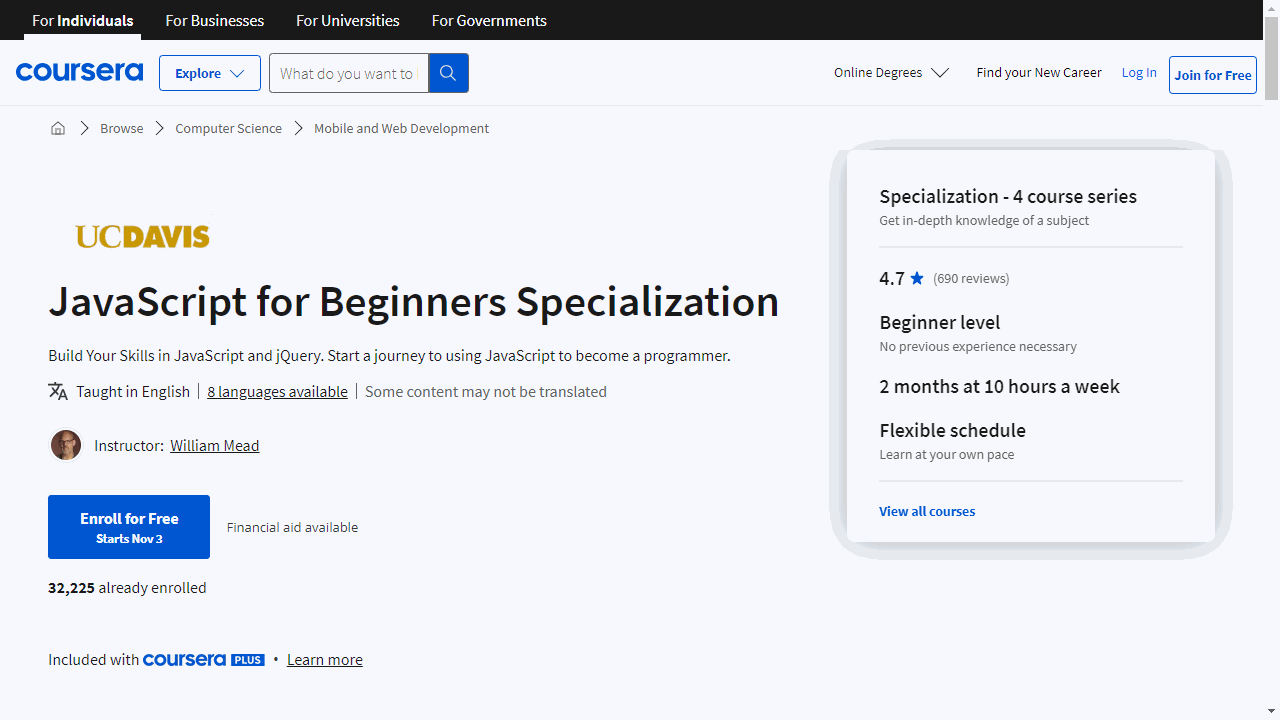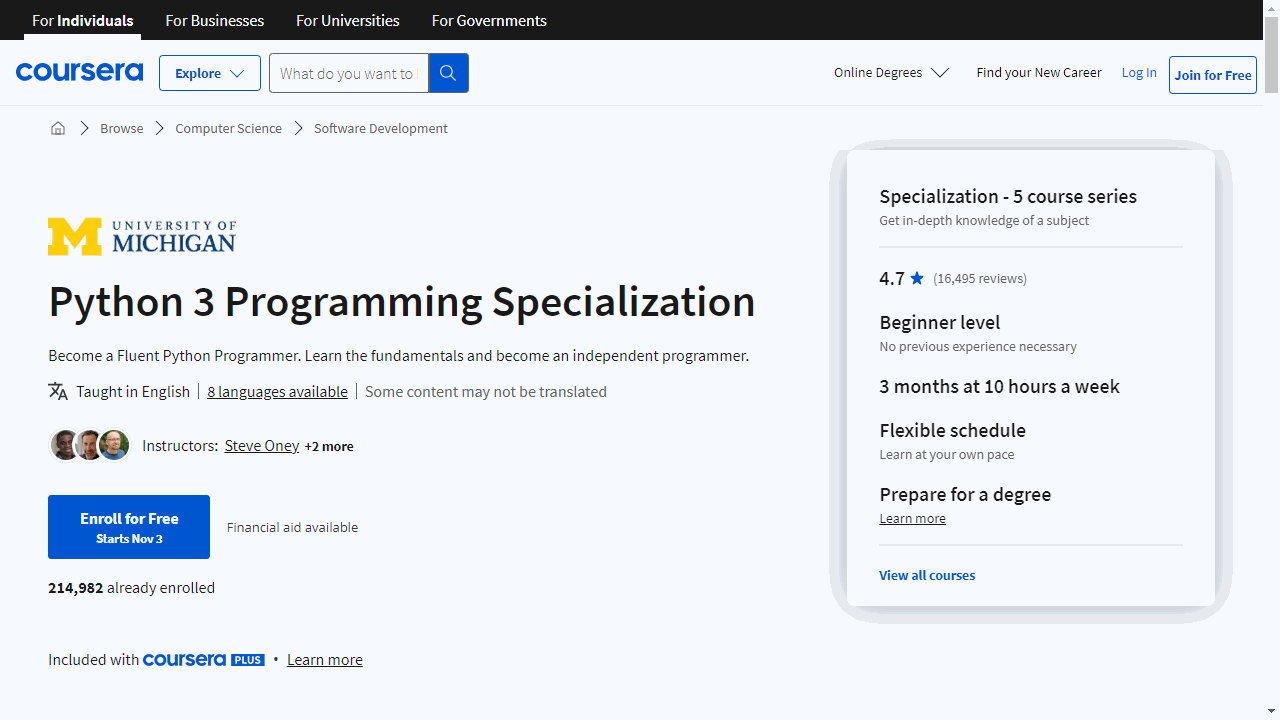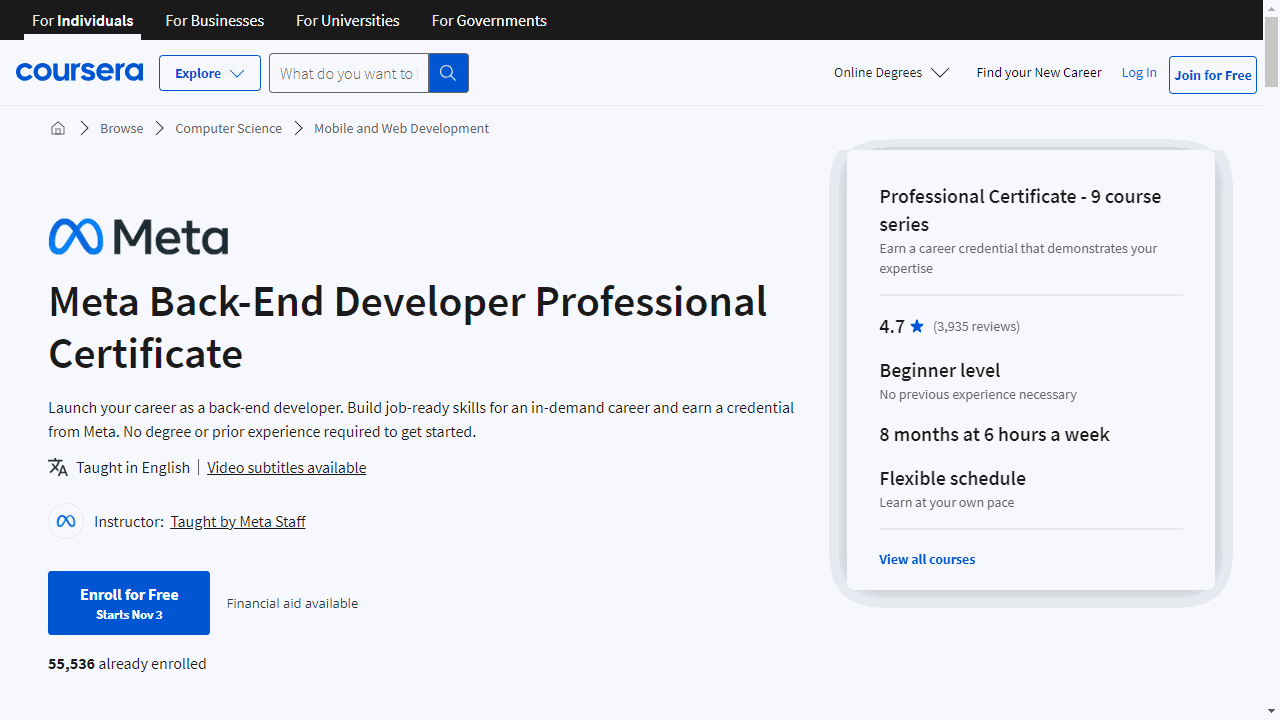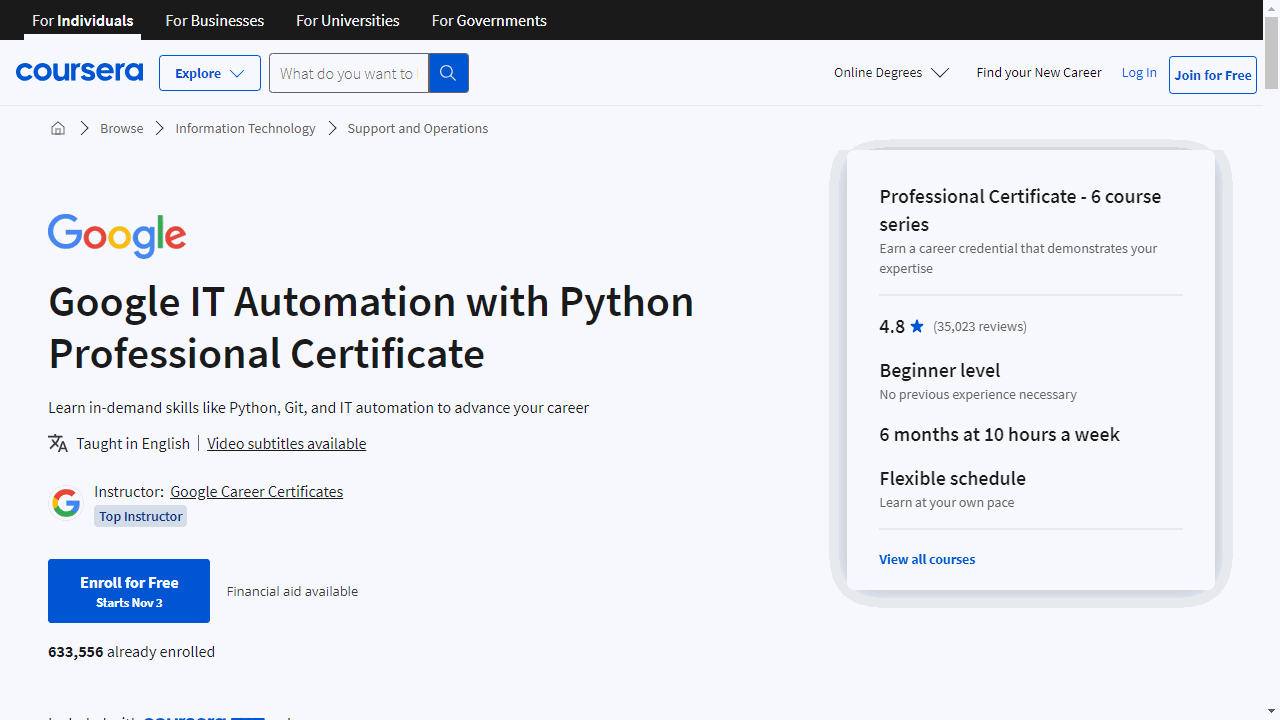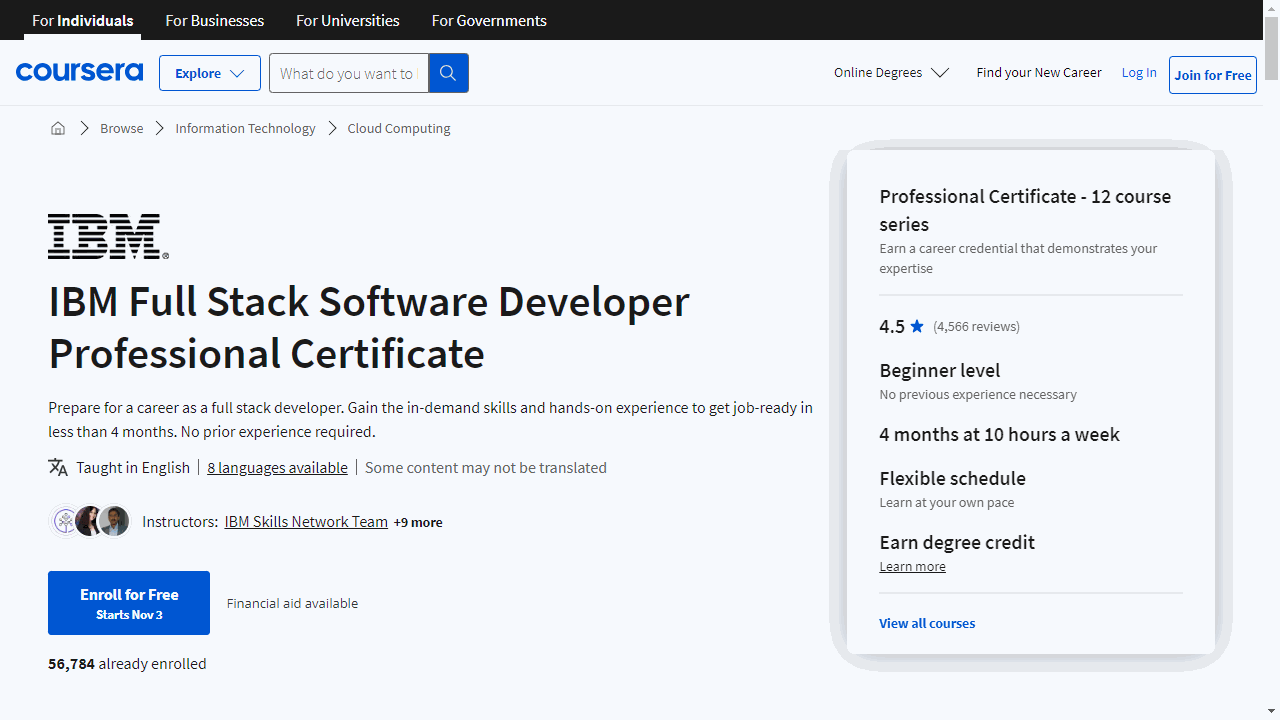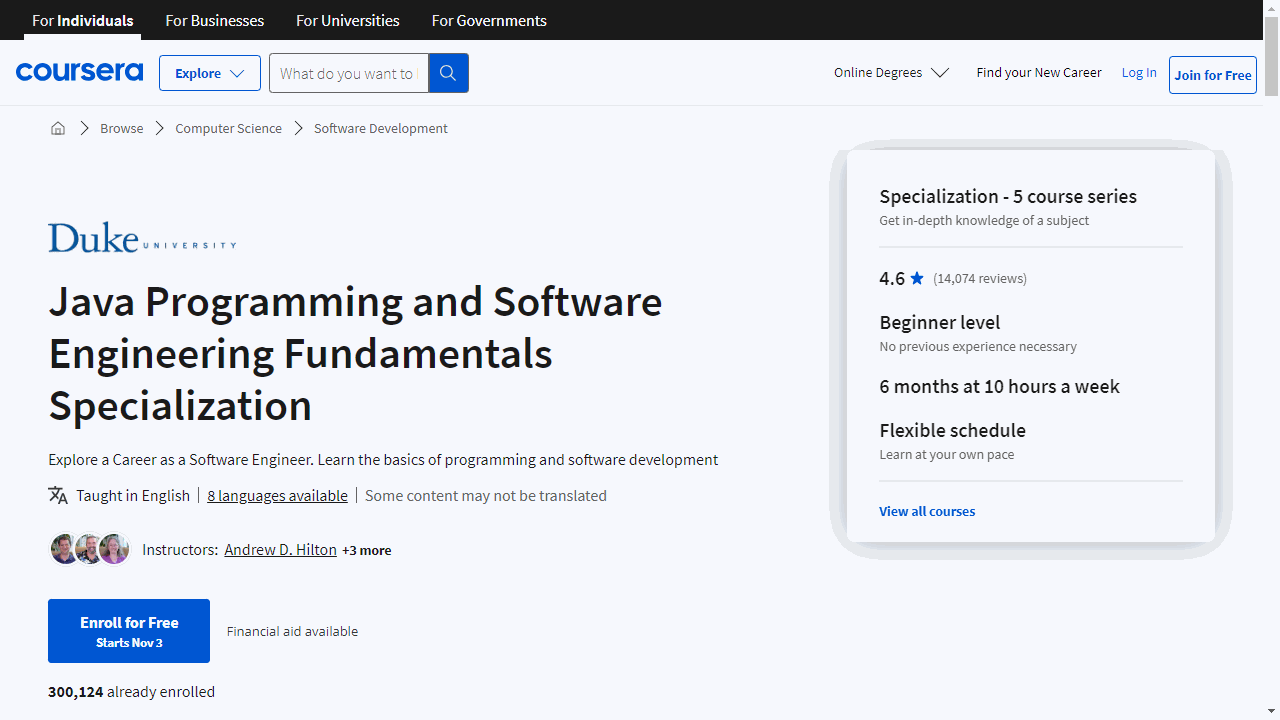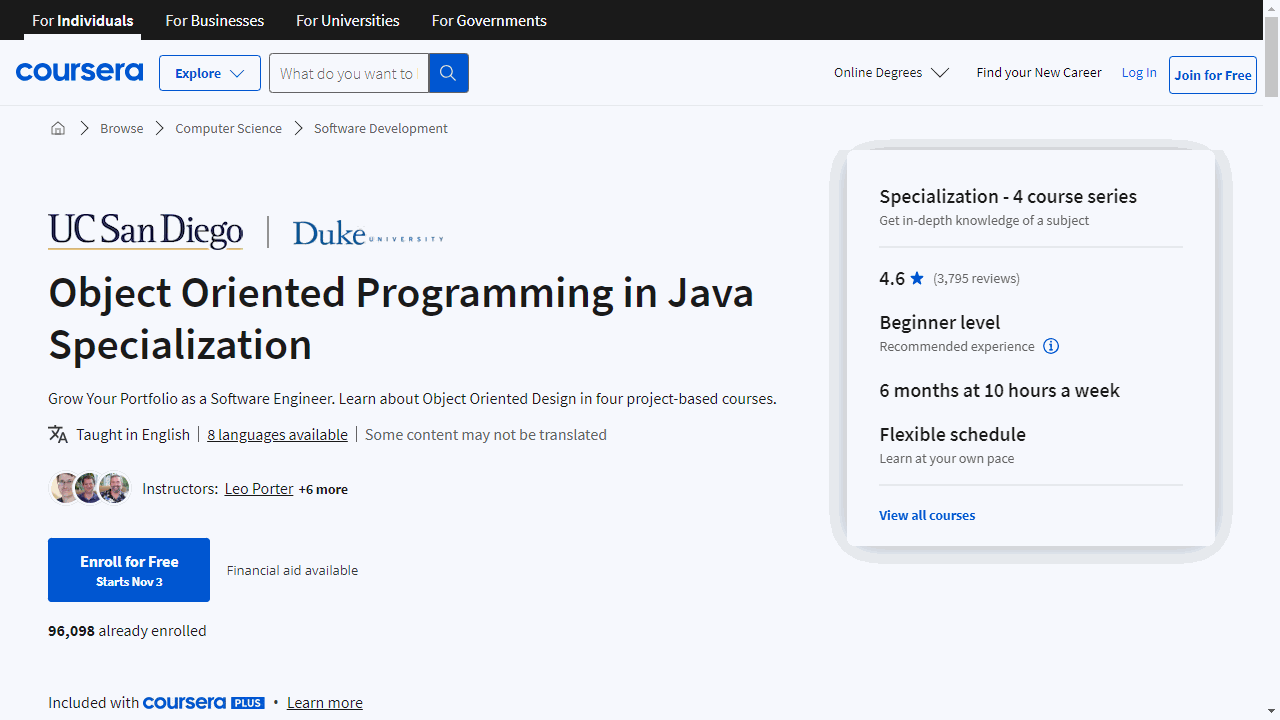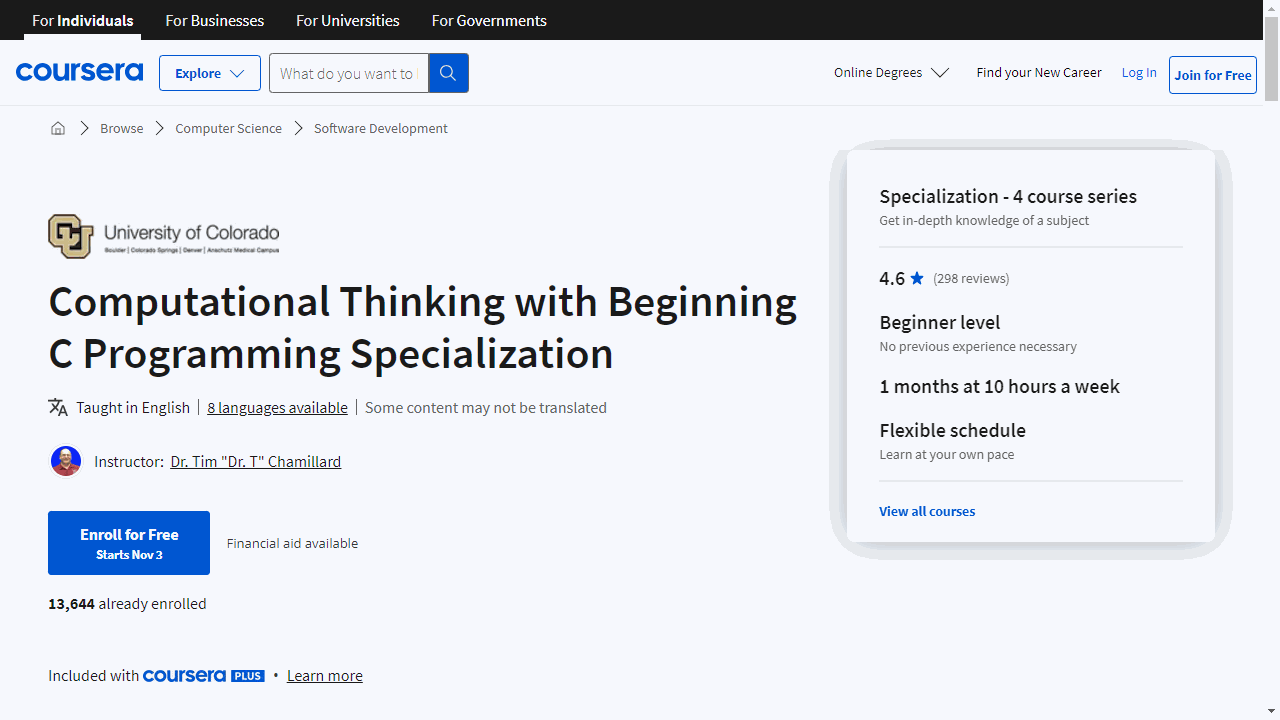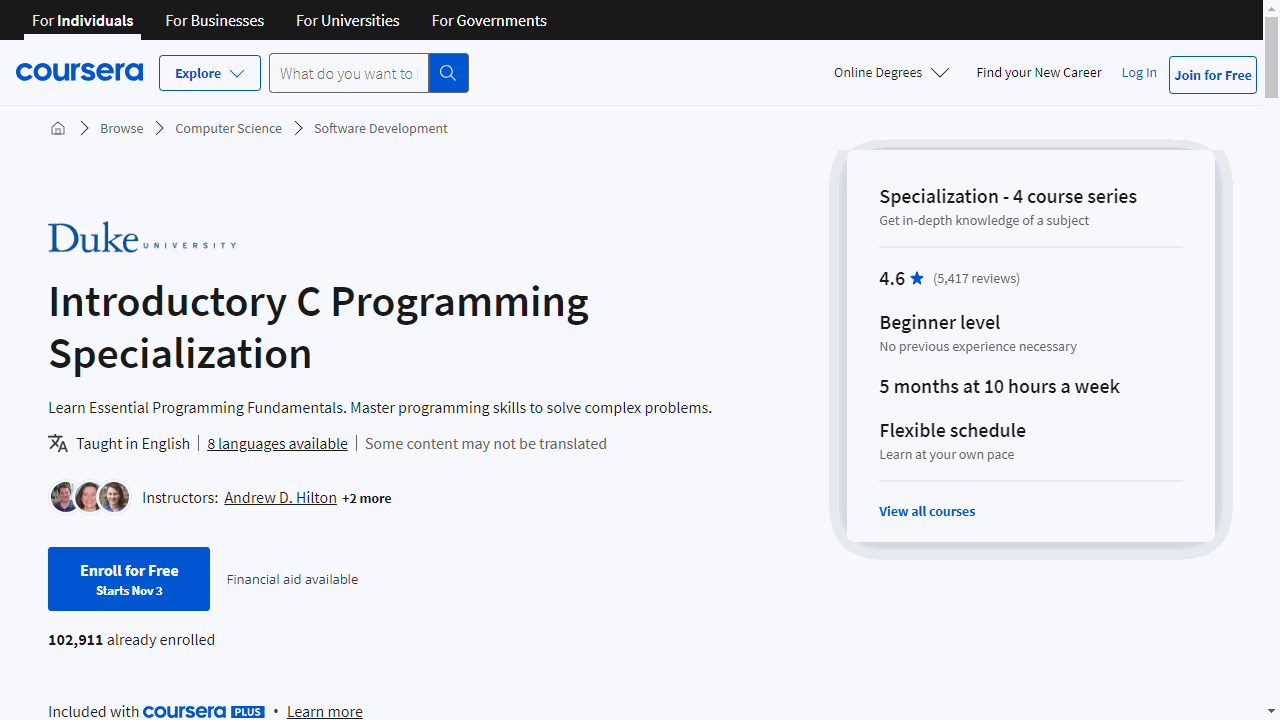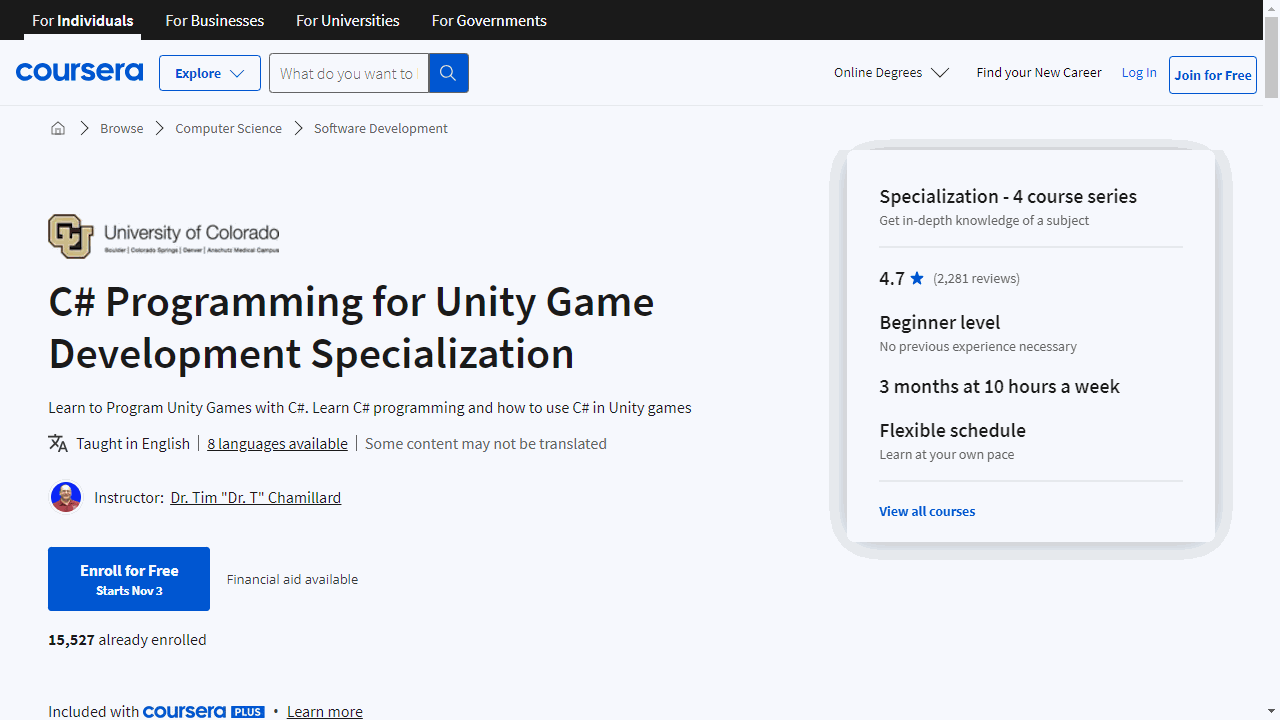Learning to program can be a great way to unlock new career opportunities and open up a world of possibilities.
It’s a valuable skill that’s in high demand across many industries, and it can be used to create anything from simple websites to complex software applications.
While there are many programming languages to choose from, Python is often considered one of the best for beginners because it’s relatively easy to learn and has a wide range of applications.
However, finding the right course to get you started can be overwhelming.
There are so many different options available, and it can be hard to know where to begin.
That’s where we come in.
We’ve researched and reviewed a wide range of online programming courses and have compiled a list of the best options for beginners who want to learn Python on Coursera.
We’ve considered factors like course content, teaching style, and overall value for money, and we’re confident that our recommendations will help you find the perfect course to launch your programming journey.
For the best overall programming course for beginners, we recommend the Python for Everybody Specialization offered by the University of Michigan.
This specialization provides a comprehensive introduction to Python, covering everything from basic concepts like variables and loops to more advanced topics like data structures and web scraping.
It’s highly rated for its clear explanations, engaging teaching style, and real-world programming assignments.
Of course, this is just one of the many great Python courses available on Coursera.
Keep reading to discover other options for beginners, intermediate learners, and experts, as well as courses that focus on specific applications of Python like data science and web development.
Python for Everybody Specialization
The Python for Everybody Specialization, offered by the University of Michigan, is a fantastic option for beginners wanting to learn Python.
This specialization covers everything you need to go from no coding experience to building real-world programs and applications. The courses use Python, which is one of the most popular and in-demand programming languages today.
The first course teaches you Python basics like variables, expressions, loops, and functions. You’ll write your first programs and learn key concepts needed for the rest of the specialization.
The next courses dive into essential Python skills like data structures, file input/output, web scraping, databases, and data visualization. Each course builds on the last, taking you from beginner to intermediate Python programmer.
By the end, you’ll be able to scrape data from websites, build databases, clean and process data, and create data visualizations.
The capstone project lets you apply everything you’ve learned by building your own data visualization application.
The courses use hands-on examples and exercises to reinforce concepts. You’ll get experience writing and running Python code yourself, which is the best way to learn.
The instructor, Dr. Charles, is highly engaging and enthusiastic.
He explains things clearly and simply, even for total beginners. Many students find his teaching style entertaining and motivating.
The Python for Everybody Specialization is the top choice for beginners starting out in programming.
Fundamentals of Computing Specialization
This comprehensive 7-course program takes you from writing your first Python programs all the way through complex algorithm design and analysis.
The courses use Python, which is an easy-to-learn and popular programming language, but the concepts you’ll learn can be applied to any language.
The first two courses teach programming basics through building interactive games and applications. This hands-on approach makes learning fun and engaging.
After you gain basic coding skills, the next courses dive into core computer science concepts like computational thinking, algorithms, and data structures.
You’ll get lots of practice applying these concepts by implementing algorithms and analyzing real-world datasets.
A key benefit is that you’ll complete over 20 projects throughout the courses. This learn-by-doing approach ensures you can apply what you learn.
At the end, you’ll have the skills to program solutions for a wide range of problems.
The courses are self-paced and flexible, with user-friendly web-based programming environments. The instructors are highly-rated academics from Rice University who explain concepts clearly. Fellow students provide support and motivation.
JavaScript for Beginners Specialization
If you are looking for a career in web development, JavaScript is a must-know language.
This set of four courses provides a thorough introduction to JavaScript, the most popular programming language for creating interactive websites.
In the first course, JavaScript Basics, you’ll gain foundational knowledge of how JavaScript works and how to write basic scripts. Guidance is provided if you need to brush up on HTML and CSS skills.
By the end, you’ll be able to work with variables, arrays, loops, and control structures - core programming concepts you’ll build on later.
The next course focuses on animations using the jQuery library.
You’ll learn how jQuery makes it easier to manipulate HTML and CSS for sleek, responsive effects on your site. Coding animations from scratch can be complex, but jQuery simplifies it.
By the end, you’ll have built an entire landing page animated with jQuery!
Interactivity with JavaScript and jQuery takes it further by introducing more advanced jQuery plugins and techniques.
You’ll make your pages even more dynamic by modifying objects and the DOM in response to user input. It’s all about making websites feel alive.
Finally, Data Manipulation in JavaScript teaches you how to work with external data sources.
You’ll learn practical skills like input validation and displaying data on the page. The course includes projects to put your new skills to the test.
With its hands-on focus, expert instructors, and real-world applications, this Coursera Specialization gives beginners like you a rock-solid foundation in JavaScript.
The skills you gain will enable you to make your websites more responsive, interactive, and data-driven. If you want to learn web development the right way, this is the perfect place to start.
Python 3 Programming Specialization
The Python 3 Programming Specialization is a top-rated series of five courses designed specifically for beginners with no prior experience.
Through hands-on exercises and engaging video lectures, you’ll gain a strong foundation in Python, one of the most popular and in-demand programming languages today.
The courses progressively build your skills, starting with Python basics like data structures, conditional logic, and loops before advancing to more complex topics like file I/O, APIs, and object-oriented programming.
The specialization emphasizes practical coding skills you can apply right away.
You’ll get lots of practice debugging code and building real-world projects like a social media data analyzer and an image processing application.
The final course lets you integrate APIs and libraries like Tesseract and OpenCV into impressive portfolio projects covering detecting faces and extracting text from images.
With over 150,000 enrollments, this specialization has proven effective for absolute beginners.
The courses stick to simple explanations and avoid unnecessary jargon. Skilled instructors guide you every step of the way with clear examples and hands-on exercises. You’ll build key programming abilities through repetition and experimentation.
Meta Back-End Developer Professional Certificate
As the name implies, the Meta Back-End Developer Professional Certificate on Coursera is designed specifically for coding beginners that want to become back-end web developers.
You’ll start by learning the basics of HTML, CSS, and JavaScript to build web pages and interfaces.
Then you’ll dive into Python, databases, version control with Git, and the Django web framework—the key technologies backend developers work with daily.
The project-based courses give you hands-on practice building real web apps and APIs from scratch. You’ll create your own restaurant reservation site, allowing you to showcase your work in a portfolio.
The curriculum was developed by Meta experts to align with industry needs, ensuring you learn the most in-demand programming languages and frameworks.
A major benefit is the flexible self-paced format. You can work through the material on your schedule, repeating sections as needed to fully master the concepts.
This certificate also preps you for technical interviews, giving you a competitive edge in the job market.
Google IT Automation with Python Professional Certificate
This hands-on certificate program teaches you Python, Git and GitHub, Linux, and IT automation from the ground up.
You’ll start by learning basic Python programming.
“The Crash Course on Python” teaches you Python syntax, data structures, and how to build simple programs. No prior experience needed!
Next, “Using Python to Interact with the Operating System” shows you how to manipulate files, processes, and automate tasks on any operating system.
“Introduction to Git and GitHub” teaches you to track code changes and collaborate with version control.
The certificate also covers crucial troubleshooting and debugging skills. You’ll learn strategies to tackle common pitfalls in code and IT infrastructure.
“Configuration Management and the Cloud” helps you automate fleet management and cloud computing.
Finally, you’ll tie everything together by building real-world automation solutions in Python.
The skills covered equip you to automate tasks, process data, build tools to solve problems, and more.
IBM Full Stack Software Developer Professional Certificate
This certificate packs 12 hands-on coding courses that will take you from having zero experience to becoming a job-ready full stack developer.
The step-by-step curriculum covers everything you need - from core programming languages like Python and JavaScript to must-have developer tools like GitHub.
You’ll start by getting introduced to essential web development skills like HTML, CSS and JavaScript. Hands-on projects let you build interactive webpages and dynamic user interfaces.
From there, you’ll level up to advanced front-end frameworks like React and back-end technologies like Node.js.
Key courses guide you through building APIs, accessing databases, and connecting web apps using RESTful architecture. You’ll gain real-world experience deploying apps on the cloud with containers and serverless platforms.
Throughout the courses, you’ll build a portfolio of projects to showcase your new skills. And you’ll get familiar with in-demand dev practices like CI/CD pipelines, microservices, and Git workflows.
The certificate culminates in a capstone project where you’ll combine everything you’ve learned into one cloud-based full stack app. This is the perfect way to demonstrate your skills and have a professional project ready for job interviews.
If you’re looking to break into the field, this is one of the best online programming courses to start with.
Java Programming and Software Engineering Fundamentals Specialization
This comprehensive 5-course specialization provides you with a solid foundation in core programming concepts and Java skills.
Java is not as easy to learn as Python, but it’s a powerful language used by many top companies for building enterprise applications.
The first course starts with the basics, teaching you how to think like a programmer and solve problems using JavaScript, HTML and CSS. You’ll learn key building blocks like functions, loops and conditionals while creating an interactive image filter web page.
From there, the courses quickly level up your skills.
The Java Programming course teaches you how to build algorithms, debug code and write programs that manipulate images and data. By the end, you’ll have analyzed CSV files to determine baby name popularity.
The third course expands your abilities using arrays, lists and structured data. You’ll read and write data files, perform quantitative analyses and create complex programs using multiple Java classes.
Next, you’ll take on even bigger challenges involving software design principles and interfaces. You’ll write programs that sort earthquake data and generate predictive text.
Finally, you’ll put all your new skills to work by creating movie and book recommendation systems, just like Netflix and Amazon use.
This will not be the easiest specialization you can take when first starting out, but it will give you a solid foundation in Java and software engineering.
Object Oriented Programming in Java Specialization
This specialization shares courses with the one above, but it’s shorter and more focused on object oriented programming.
The first course starts with the basics - you’ll learn how to code in Java, solve problems through programming, and design algorithms.
At the end, you’ll build a program that analyzes data to determine baby name popularity. This lays the foundation you need as a beginner programmer.
The second course builds on those skills. You’ll learn how to work with data files, arrays, and lists to build more complex programs. A key project is writing an encryption program.
The third course is where you’ll master object oriented programming.
This is a crucial concept for professional and personal programming projects. With a unique course structure, you can progress at your own pace. The final project involves building a graphical user interface program.
Finally, you’ll learn how to work with large data sets. The program you build will manage and analyze text data. You’ll compare algorithms and data structures to optimize efficiency.
Computational Thinking with Beginning C Programming Specialization
C is a heavily used programming language that is harder to learn than Python or Java.
It might not be the best choice for your first programming language, but it’s a great option if you are up for a challenge.
You’ll start by learning foundational concepts like algorithms, data collection, and writing your first C program.
The material builds from there, covering key programming topics like data types, variables, selection, iteration, arrays, strings, and functions.
A major highlight is the focus on computational thinking - breaking large problems into smaller steps.
This trains you to think logically and develop effective programs, skills that apply to any programming language.
The courses also connect concepts to real-world STEM applications so you can see how programmers solve practical problems.
While challenging at times, the material is presented clearly in bite-sized modules so you can master each concept.
Introductory C Programming Specialization
This four-course series will take you from having zero knowledge to being able to write complex C programs by the end.
The first course, Programming Fundamentals, is the perfect introduction.
You’ll learn the core concepts of programming like algorithms, pseudocode, and problem solving strategies. The instructor does a great job breaking down the foundational skills in an approachable way.
In the second course, Writing, Running, and Fixing Code in C, you’ll go from planning programs to actually writing real C code.
The course guides you through compiling, running, testing, and debugging programs. This is where you’ll start to feel like a real programmer!
The third course covers more advanced topics like pointers, arrays, and recursion.
These powerful techniques will allow you to write far more complex programs. The teacher takes the time to explain these concepts clearly.
Finally, the fourth course shows you how to build programs that interact with users, files, and manage memory dynamically. You’ll learn skills like taking user input, reading and writing files, and allocating memory as needed while a program runs.
By the end of the Specialization, you’ll be able to code in C with confidence.
You’ll have a portfolio of programs showcasing your new skills to share with employers or to build on for future learning.
C# Programming for Unity Game Development Specialization
This specialization is made up of 4 courses that will take you from no prior coding knowledge to building your own Unity games with C# by the end.
The first course starts with writing your very first lines of code in C# and builds up core programming concepts like variables, classes, loops, and more. You’ll get hands-on experience applying these concepts by building simple console games.
In the second course, you’ll dive deeper into C# and Unity.
You’ll learn how to get user input, use loops for repetition, and work with data structures like arrays and lists. By the end, you’ll expand on a Unity game you built in course 1.
The third course focuses on code abstraction and object-oriented principles.
You’ll learn how to organize code into classes and methods for reusability. This will prepare you to build Unity classes for your games. You’ll also add text, scores, and sound effects to make your games come alive!
The final course takes your skills to an intermediate level.
You’ll implement robust game features like file input/output, inheritance, and event handling. By the end, you’ll build a complete small Unity game yourself!
Also check our post on the best Programming courses on Udacity.
